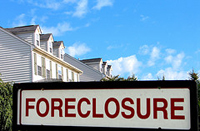
Foreclosure is done, when the home owner is unable to meet the mortgage payments and the lender will then take over the title of the property. The exact way in which foreclosures are performed will differ from one state to another. Essentially the inability of the homeowner to meet their mortgage obligations will result in a foreclosure taking place. At this point, the bank or the mortgage lender will possess the home or will sell the home in an auction to recover their mortgage dues.
Foreclosure is a legal process and the timeline for processing the foreclosure can be from 3 – 12 months depending on the state in which the homeowner resides. Due notice is given to the debtors before the actual disclosure takes place. This means that if the homeowner can pay the outstanding dues after getting a notice, then the mortgage lender will usually reinstate the loan. This can stop the foreclosure. However after repeated notices, sometimes three, if the homeowner fails to pay up or doesn’t contact the lender, then the home can be foreclosed.
When the homeowner defaults on the mortgage payments for the property, the trustee of the court will record a NOD or notice of default. If the homeowner does nothing at that stage, then the home will be recorded for the pre foreclosure stage. At this point the information is available to other real estate investors and real estate agents. Many investors like to move in at this point to buy the property. Even at this stage, if the homeowner meets the lender, then they can refinance or modify the mortgage loan and stop the foreclosure from happening. In case the homeowner is able to contact the lender, then they can sort things out.
This depends on each homeowner and the financial difficulties/ situations that they are facing. In most cases, loan can be modified or a certain time period is given to repay the outstanding amount. During this time period, the homeowner will have to become current on the overdue mortgage loan.
Traditionally banks which are the large mortgage lenders don’t want to go in for a foreclosure. This is because; they are on the business of making money and not winding up with foreclosed properties that they need sell. Moreover foreclosures are costly affairs and it would cost the bank quite a bit of money on closing costs and selling of the property after the property has been foreclosed. They would rather negotiate the deal with the homeowners and kept them stay in their house. In this way they can modify or refinance the loan and yet get a part of their investment back. In cases, where the homeowner can’t make any of the mortgage payments, the banks will usually allow for a short sale. In a short sale, the property is sold and the bank is willing to take a lower amount than the current value of the home.
Photo by taberandrew
ForeclosureDataOnline.com has a huge database of foreclosure listings for sale in areas like Newark, Buffalo, Pittsburgh and in the whole country. It also provides news about the Real Estate market and anything related to the foreclosure crisis.

Leave a Reply